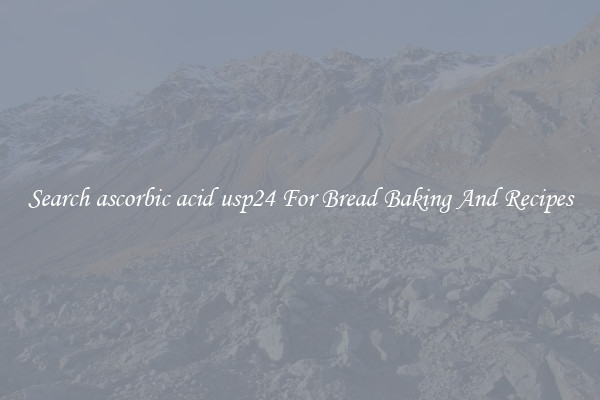Search ascorbic acid usp24 For Bread Baking And Recipes
Ascorbic acid, also known as vitamin C, is a common ingredient used in various food and beverage products. While it is most widely known for its importance in boosting the immune system and preventing scurvy, ascorbic acid also serves as a valuable component in the field of bread baking and recipe development.

When it comes to bread baking, ascorbic acid plays a crucial role in improving the quality of the dough and the final product. It acts as a dough conditioner, enhancing gluten development and strengthening the dough structure. This helps to create a more elastic and flexible dough, resulting in bread with a desirable texture and volume.
In addition to its role in gluten development, ascorbic acid also acts as a powerful antioxidant in bread baking. Oxidation can negatively affect the quality of baked goods and lead to a shorter shelf life. By incorporating ascorbic acid into bread recipes, bakers can effectively delay the oxidation process, extending the freshness of their products.
Aside from its functional benefits, ascorbic acid also imparts a slight tangy flavor to bread, helping to enhance its taste. Many artisan bakers appreciate this subtle acidity, as it adds complexity and depth to the overall flavor profile of the bread.
When searching for ascorbic acid in the context of bread baking and recipe development, it is advisable to look for the USP24 grade. This designation ensures that the ascorbic acid meets the standards established by the United States Pharmacopeia (USP), which ensures consistent quality, purity, and safety. Using a USP24 accredited ascorbic acid assures bakers that they are incorporating a reliable and high-quality ingredient into their baking endeavors.
In terms of application, ascorbic acid can be added to bread dough in various ways. It is usually mixed in with the dry ingredients before incorporating the liquid components. Bakers can experiment with different quantities to determine the optimal amount needed to achieve the desired results.
Furthermore, ascorbic acid is not limited to bread baking alone. It can be a valuable addition to various recipes, including cakes, pastries, and even savory dishes. However, it is important to note that the quantity of ascorbic acid required may vary depending on the specific recipe, and it is advisable to follow recipe instructions.
In conclusion, ascorbic acid USP24 offers significant benefits in the realm of bread baking and recipe development. Its ability to improve gluten development, act as an antioxidant, and enhance the flavor makes it an essential ingredient for bakers and recipe creators. By incorporating ascorbic acid into their baking endeavors, both professional and home bakers can elevate the quality and taste of their bread while prolonging its shelf life.

View details

View details

View details

View details





